#New democrates
Text
This post belongs to
Bent Sejrø
and Bent Sejrø only
Honestly his speech at the party congress where everyone thought he was a senile old man and Birgitte Nyborg‘s last fan but he comes on stage like a freaking pro to sing his praises of Jon Berthelsen and shame Birgitte for all the shit she‘d done.
#Bent Sejrø#Nye Democrates#New democrates#jon berthelsen#birgitte nyborg#borgen#borgen power and glory#love
5 notes
·
View notes
Text
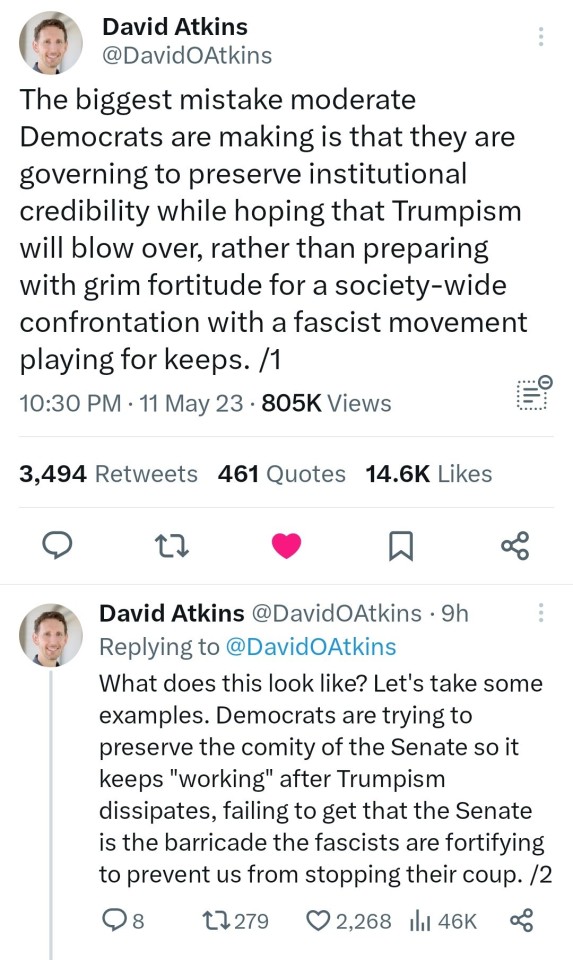
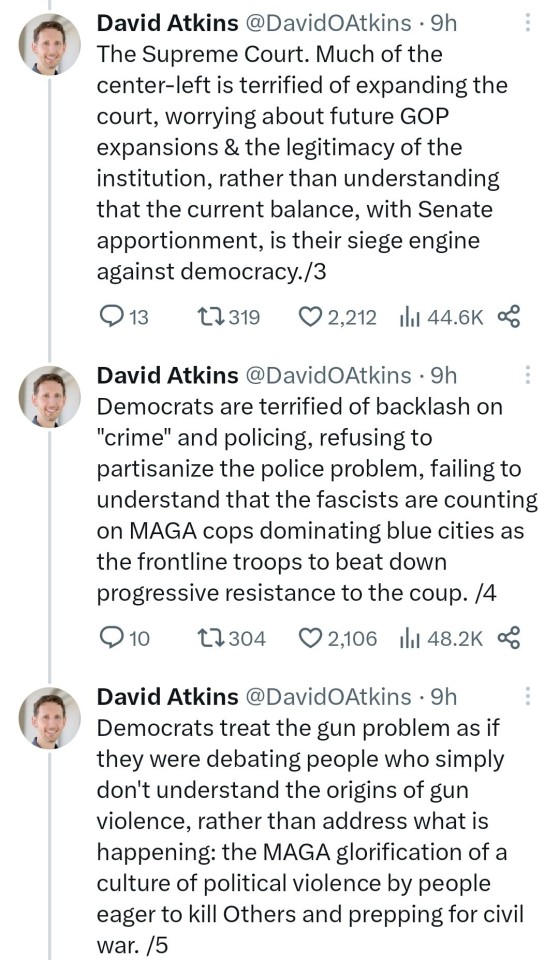
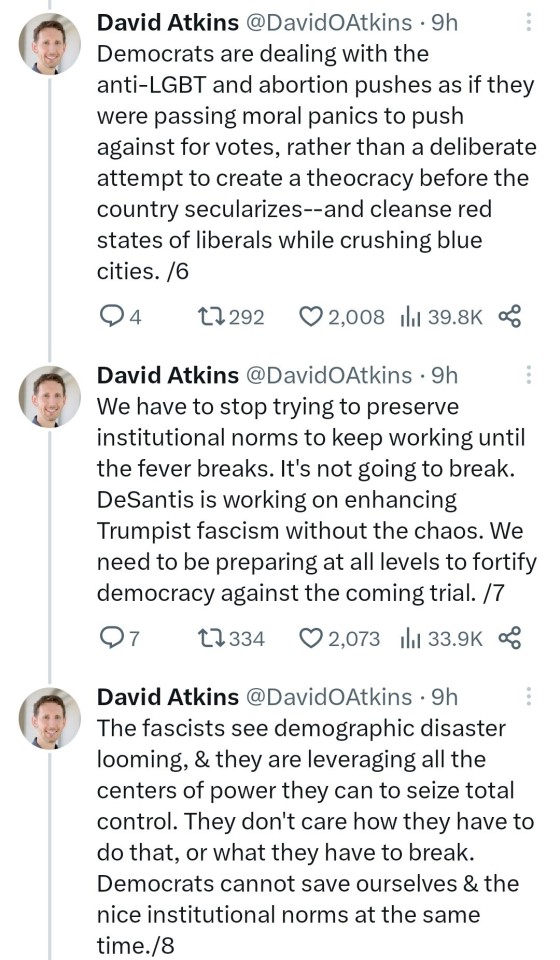
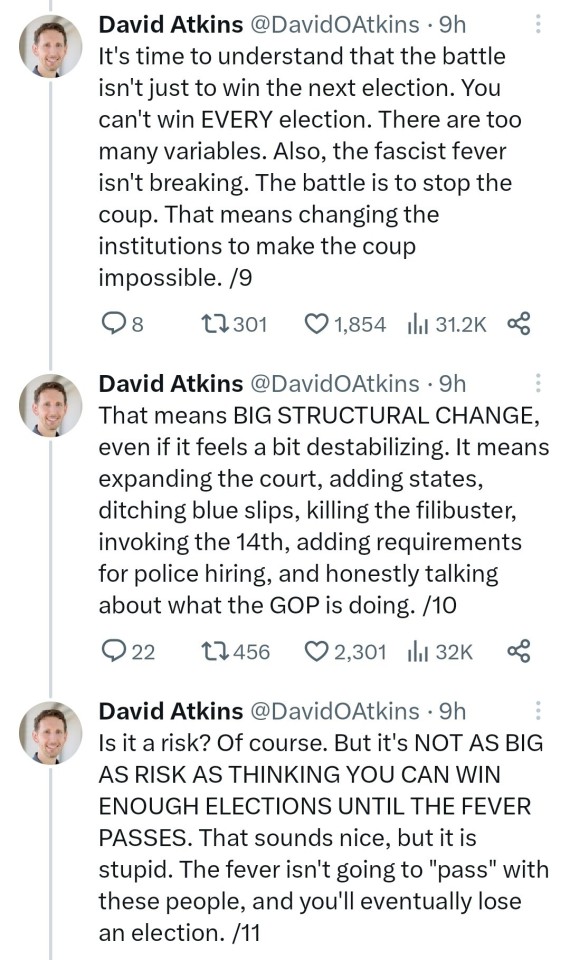
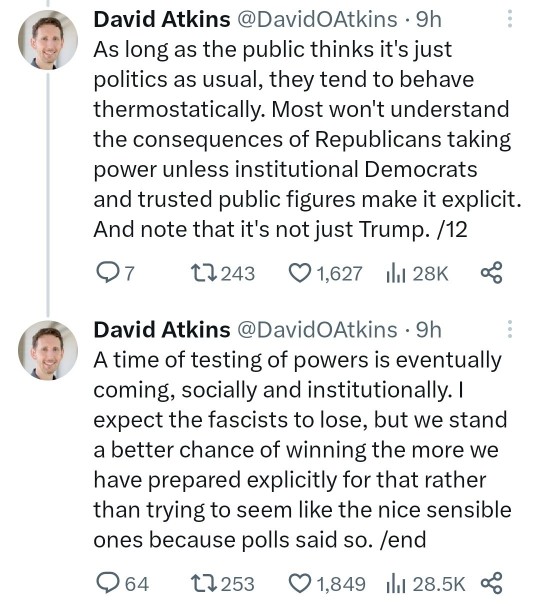
#democrates#democratic party#queer#democrat#lgbtq#democrats#lgbtqia#anarchism#left wing#leftist#lesbian#sapphic#socialism#communism#marxism#us politics#politics#lgbtq community#uk and australian islanders#team news#us boy#warner brothers confirms#says expert
88 notes
·
View notes
Video
youtube
Dominic Carter: The Voice NY Trusts on Trump's Bold Move. This is how Dan Bongino praised Dominic
Are Democrats in danger? Dominic Carter, a seasoned journalist and a staple in New York media, shakes up the political landscape on 77 WABC Radio. With decades of experience, nobody knows New York or its politics quite like Dominic. As Trump ventures into Harlem, receiving unexpected support, it raises alarms for Democrats. Could this signify a pivotal shift in voter sentiment among traditionally Democratic strongholds?
Dominic Carter sheds light on the far-left politicians' failure to address the critical issues affecting their base, including the migrant situation and NYPD policies. He warns that ignoring these brewing frustrations could lead to significant political repercussions. As Trump makes strategic moves, engaging directly with African-American and Latino communities, Dominic questions if the Democrats are underestimating the influence of U.S. Immigration and Customs Enforcement (ICE) on local sentiments.
#youtube#Base Support Trump Challenge Harlem Welcome New York Insider Election Africanamericans Political Consultants 1010 WINS Dominic Carter Democr
0 notes
Text
Prolongation du TPS pour Haïti: le leader démocrate au Sénat américain Chuck Schumer exprime sa fierté
Prolongation du TPS pour Haïti: le leader démocrate au Sénat américain Chuck Schumer exprime sa fierté. #J7dec2022 #Juno7
Prolongation du Statut de Protection Temporaire (TPS) pour Haïti: le sénateur de l’Etat de New-York Chuck Schumer exprime sa fierté après la décision de l’administration Biden.
Le sénateur de l’Etat de New-York, Chuck Schumer, a exprimé le 5 décembre 2022, sa fierté après la décision de l’administration Biden de prolonger le Statut de Protection Temporaire (TPS) pour les haïtiens. Pour le Chef du…
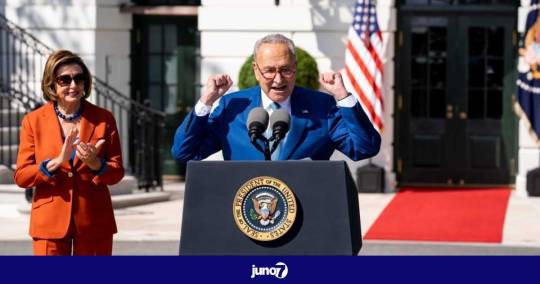
View On WordPress
0 notes
Text
Bailey is trailed by double digits by Pritzker;Voters continue to prioritize the economy.
Bailey is trailed by double digits by Pritzker;Voters continue to prioritize the economy.
With early voting beginning this week in some parts of Illinois, Democratic Gov. JB Pritzker leads GOP challenger State Sen. State Sen. by 15 points. The majority of voters (51%) back Pritzker’s reelection, while 36% back Bailey.With just under six weeks until Election Day, only 5% of those polled plan to vote for someone else, and 8% remain undecided.Bailey’s campaign has been emphasizing a…
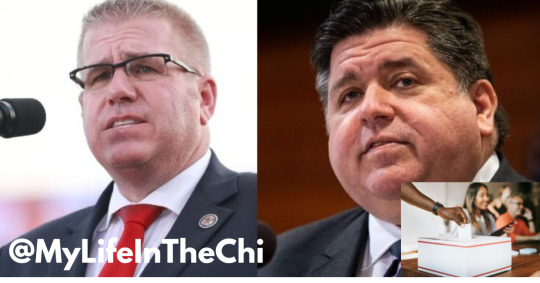
View On WordPress
0 notes
Text
Minnesota, seen as abortion haven, still funds ‘crisis pregnancy centers’ | MPR News
Since 2005, Minnesota has given over $3 million in taxpayer money every grant cycle to 25 of these centers under the “positive alternatives grant,” a program created by former Gov. Tim Pawlenty to discourage abortion.
Now with a DFL hold on the state, Walz says he’s ready to end the program, citing misinformation.
“I think that there’s a lot of misinformation that came out of that … I think women deserve better than that, I think they deserve to have the whole picture,” he told MPR News in January.
This comes after Minnesota Attorney General Keith Ellison issued a consumer alert in August against “crisis pregnancy centers” based on a 2021 study of nine states including Minnesota. He defined them as “private organizations that seek to prevent people from accessing abortion care as well as contraceptives.”
“CPC is a term used to refer to certain facilities that represent themselves as legitimate reproductive health care clinics providing care for pregnant people but actually aim to dissuade people from accessing certain types of reproductive health care, including abortion care and even contraceptive options,” the American College of Obstetricians and Gynecologists says.
141 notes
·
View notes
Text
There's good news in the world, even if it's getting drowned out by the bad. Today I turn your attention to Poland where voters, working against a rigged system, turned out in such large numbers that they defeated the Law and Justice Party which had been slowly sliding the country toward an authoritarian system.
It remains to be seen how effective the new government will be and whether it can fully reverse the slide, but I think it's great to see so many Poles turning out against the odds in the hopes of making things better.
24 notes
·
View notes
Text
DeSantis won 58% of the Latino vote, including 68% of Cuban Americans, 56% of Puerto Ricans, and 53% of all other Latinos combined, according to the NBC News exit poll. [...]
DeSantis’ lieutenant governor Jeanette Nuñez, a Cuban American from Miami and a Florida International University graduate, helped the governor make inroads among Latino voters.[...]
During DeSantis’ years as governor, Venezuela’s economy was in near collapse, Nicaragua’s president consolidated power — cracking down on dissent — Cuba’s government quashed historic protests, and Colombia elected its first leftist president, who is vehemently opposed by many Colombian Americans in Miami.
"Why do Florida Latinos [primarily from a certain country] support Republicans"

15 Nov 22
102 notes
·
View notes
Text

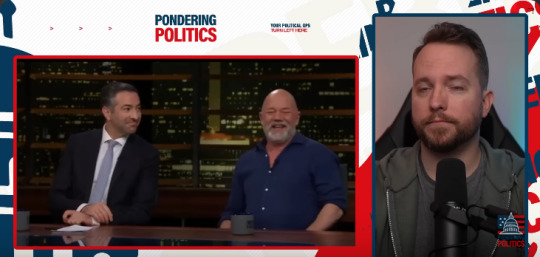
After initially finding some common ground on the matter of Donald Trump's 14th amendment constitutional challenges conservative writer Andrew Sullivan had a heated exchange with MSNBC commentator Ari Melber on Real Time with Bill Maher about to what extent both sides the progressive left and the Democratic party versus the progressive right and the Republican Party are responsible for the current toxic state of American politics.
We have a couple of Clips to look at in this video and I'll say the most recent episode of Real Time with Bill Maher a show that I don't follow that much anymore was actually pretty good fodder for commentary.
We just did a video about the interview between Maher and Gavin Newsome the governor of California.
But this exchange between Sullivan and Melber who are two political commentators of two very different political lenses was fascinating to me because it spoke to one of the things that we complain about quite a bit on this channel which is the urge of centrists and conservatives and even some on the left to create this artificial balance - this false equivalence between two imperfect but still wildly and fundamentally different political factions and so with that in mind I want to play this clip and for context Maher is going to ask about or ask these two about a recent story about a right-wing Republican Trump Ally wanting to do something pretty drastic.
Maher:
So Roger Stone one of his favorites. This is amazing that I mean it was not a big story I would think it would be media I reported it. there a tape he's talking about killing people for Trump I not saying with Trump's approval but he says it's time to do it let's go find that's Congressman Swalwell it's time to do it then we'll see how Brave the rest of them are it's either Swalwell or Nadler has to die before the election let's go find Swalwell and get this over with. That’s not right is it? I mean I feel like we're spinning out of control a little here with this…
Sullivan:
I think what Trump set in motion and what the divisions of the country has done and what the Democrats have done the last four years which has respond to Trump by going even further to the left means that we are losing the legitimacy of the system and that is the critical thing when you lose that core legitimacy you lose your democracy that's where we're really going to lose our democracy because we don't believe in it anymore and you can see that the result of that the way this works is you start disbelieving in all the institutions and then you say who do I want you want a strong man you want someone to come in and cut all the knots this is the classic case of how you lose a democracy yeah and he's almost certainly going to be there he's going to win this election.
So before Melber responds I just want to remind you okay Maher just provided a recent story which in my opinion was hella under reported about a very close Trump Ally a guy who worked on Trump's 2016 campaign Roger Stone in private scheming about murdering two Democratic Congress people. Okay so that is a right-winger scheming to perpetrate a heinous crime against two left-wing public officials and you know Andrew Sullivan's first instinct to say yeah Trump kind of set this emotion but man the Democrats they've really pushed far left so that's the context just to remind you and this is how Ari Melber responds.
Melber:
I think you make Fair points Andrew but you sound a little bit both sidese I don't know if that's on purpose. But there are absolutely problems with the Democratic Party and the overreaction to Trump. We just spoke about the ballot case and its thinness and we cover that all the time on the news. But there's not equivalence here on the problems that you just referred to…
There’s not equivalence on political violence
There’s not equivalence on responding to court cases.
Bush vs. Gore was very controversial but there was no violent response and there was not any mainstream response from Democrats about overthrowing the certification. Al Gore actually showed up on Jan 6 remember it was that date and certified it so there isn't a bothsidesism to this Decay and what Trump does And I agree at times he may draw his opponents into messy dumb feuds but he is the one banking on a cynicism an attack on democracy and a complete rejection of the policy democracy that you want because they didn't even have a platform so he's saying “It's just me. You don't even know what I'm going to do just vote for me”. No platform and you've got a whole Republican party that's basically codifying that.
So Sullivan's about to respond but I just want to emphasize Melber's response there was very accurate very honest and I would argue perhaps even charitable to a fault. He went out of his way to acknowledge -- which is something Republicans very rarely do if ever -- that there are issues with the Democratic Party and he said it repeatedly and he also reminded Sullivan of the Common Ground that they shared earlier in this interview because both of them think that the 14th Amendment challenges to Donald Trump's eligibility are weak and this is coming from an MSNBC legal commentator and he's publicly admitting that at least from his perspective (I completely disagree) but that's his perspective. So he's again going out of his way to try to establish some commonality and reiterate that with Sullivan while also saying you can't create a false equivalence here if you do I'm going to reject it.
Note how Sullivan responds
Sullivan:
It would be good at MSNBC if you actually did think about both sides and weigh the arguments and make constructive arguments against that side while respecting them. You don't do that. It’s propaganda all the time.
Melber:
What you just said - just describe my show. I had a trump lawyer on this week I've had Steve Bannon on my show I've had officials …
So describing a goal that I'm achieving I take that as a compliment
Sullivan: well you might.
You can tell there's obvious tension there. But also know Andrew Sullivan started to say something before Melber cut him off-- which was you know… he’s like… you should make constructive arguments … and respect the people that are making those arguments.
Well and here's the thing -- Melber just did that. Melber just said - and then he goes on to say Sullivan does that you know you're denying the denying and he was clearly starting to say that you're denying that Democrats do anything wrong but Melber actually said that to the contrary. He’s like there are issues with the Democratic Party and he talks about how the Democratic Party will fall for various rhetorical traps of Trumps and perhaps overreach from time to time in their criticism of him so again he was generous reiterating the common ground and making it very clear that he doesn't think the Democratic Party is perfect. That went right over Andrew Sullivan's head because even though Andrew Sullivan by the way and he even mentioned it in this interview he doesn't like Trump he thinks that Trump is dangerous he doesn't he won't vote for Trump I want to be very clear he's an anti-trump conservative he still is compelled to try to create some artificial balance between his side and the opposition when his side is very clearly in the wrong far more often. They have fewer facts on their side there are much many more moral transgressions on their side and Sullivan is not prepared to confront that fact right.
He’s prepared to seed the ground on Trump but he… well uh… you know listen… well the left has its problems too
Well listen if you're going to be an honest conservative if you believe in conservative principles which presumably Andrew Sullivan does
You should also have the Integrity to admit that… yeah right now … like Liz Cheney. I don't like Liz Cheney. Liz Cheney's voting record and her policies are terrible but Liz Cheney will admit and has admitted publicly that right now there is a bigger problem by far with the Republican Party than the Democratic Party. and this is coming from not just a lifelong conservative but somebody who was a lifelong Republican and a republican public official right and even she has found the fortitude to say that right now it's not a both sides issue not that both sides are perfect but one is much worse than the other
Andrew Sullivan doesn't have the courage to admit it and he's so biased in that respect that even when Ari Melber says yeah the Democratic Party has its faults.
Sullivan doesn't hear. “You deny that there's any problem with the Democratic Party”.
Well no I don't. But the other thing I want to focus on is this idea that you know listen you should be able to give constructive criticisms of the right while still respecting the right and we've talked about this before again that asymmetry of expectation.
When is the shoe ever on the other foot?
I think it was yeah Nicholas Grossman wrote this article in the Bullwork back in August of last year “The media still doesn't get Biden voters”.
We’re not going to read the whole thing but just to give you a bit of a refresher.
“Conservative and mainstream media don't agree on much but one point of consensus is that everyone should work harder to understand Trump supporters. The implicit message you don't have to agree with the populist right but you should be listening to empathizing with and engaging with them more
And he gives two various examples.
Actually numerous examples of like a New York Times article and Matt Yglesias who is like a liberal leaning Centrist always talking about how important it is to show empathy and understanding for the right.
But this is what Grossman points out:
“Seeing these arguments I was struck by the asymmetry of our political moment. I've never seen Centrist like Iglesias say to people on the right or Center that it's important to read progressives (even if they're super woke or whatever left-wing equivalent of Hanania’s racism is). Nor have I ever seen traditional conservatives like David Brooks call for empathy with people on the left or claim that any left-wing extremism is merely an inevitable reaction to Centrist and conservative Elites mistakes. Reporters don't do safaris to Biden country seeking to understand what the voters who put him in the white house while there are pieces explaining how for example black women in Georgia suburbs made a big difference in the 2020 election there's nothing approaching the ongoing coverage of white men in Ohio diners.
And so on and so forth and he goes on and he makes the case like listen you know to whatever extent it is the moral obligation of the left to understand the right by definition the right has the same obligation. Especially when and very often they're in a position of minority. There are more people who vote Democrat - so if Republicans want to win more elections perhaps they should also take time - like damn why are people voting against Donald Trump? Why are people voting for Joe Biden or Barack Obama or whoever it may be?
But again that's never the expectation. Andrew Sullivan doesn't talk about that. Conservatives and Centrist don't talk about that. It’s always the impetus is always on the left to understand the right. Democrats to understand Republicans.
And my position is this - if that is an obligation - it is it is by definition and it's non-negotiable it has to be reciprocal.
If the left has to understand the right - the right must understand the left.
The left's… you know Fox News and others as well they should be asking “why do so many people hate our party's front runner?” but nobody asked that question -- and it's always blamed on TDS Trump Derangement Syndrome.
This asymmetry is disgusting it really is- and I love the fact that Ari Melber publicly called it out you know. So I think that was a great exchange and I think it further illustrated the weakness of conservatives and centrists again they cannot function
Everyone is always beholden to them everyone must come to them and understand them and understand their views and perhaps so -- but they should reciprocate they have a moral obligation to do so.
Ari Melber very clearly won that argument and you can see it with how upset Andrew Sullivan got how triggered he got and I love it
I love seeing that exposure of the weakness of centrists and conservatives and their snowflakes. They just can't handle it.
So let me know what you think in the comments
3 notes
·
View notes
Text
A lot of left (and anti-left) discourse relies on acting like it's 1965 and numbers are going up forever and the quality of life is increasing for everyone in "the imperial core" so that the only problems are in the third world; so you got on the one side social-democrates acting like Marx is obsolete and on the other side anti-imperialism saying actually it's because the white western working class is sucking at the tits of big imperialism.
The issue is the basic phenomenon at stake just isn't real, the Thirty Glorious Years ended half a century ago, the situation of the working class in the most advanced countries have been stagnating or actively degrading for years. They are trying to push back the age of retirment here in France right now! Yes, we have Iphones now which is nice but next to some cheap luxury the price of the basic necessities of life is the same, proletarians still have to work just as much to buy the price of our own existences despite society as a whole being richer than ever. And we're all perpetually waiting for the next crisis. You don't need to "explain" the privileges of western workers with imperialism. The situation of western workers is not that good!
And it bears to say that even in the 1960s some marxists kept the faith and predicted the situation would not last and the post-war prosperity was an aberration, not the new norm. History vindicated them and now the economy basically works just like Marx always said it does but everyone is just kind of ignoring that I guess lol.
10 notes
·
View notes
Text
3 notes
·
View notes
Note
Do you know if brazil will get better equality between citizens with their new president democrate ?what is the opinions about bolsonaro as non president now and their new president?


about the citizens’ rights in brazil with their new old president: (all reversed) the magician, kings of cups and pentacles • (upright) the fool
let me think.. no. it will be even worse. if he did that i will write between 2003 and 2010, silva will still manipulate his country’s citizens as ever. i don’t think he will let them be free. he will be as controlling as ever, and will make a turn point for brazilians.
the hope for the brazilians is the fool in the bottom, so the chances of the current president of brazil resigning by force via protests are there, but are not very strong for now.
are brazilians happy that bolsonaro isn’t president anymore: six of cups, ace of swords • four of swords
oh, definitely! they’re more chill now
brazilians’ opinion of their current old president: two of cups, eight of swords rx, wheel of fortune rx • temperance
quite mixed. some people hope he will fix brazil, others don’t have the hope for it. it’s really that fifty-fifty if i have to make a random guess
just they don’t have to be as dumb as bulgaria and vote for dumb guys who questionably or not allegedly graduated harvard🤓
3 notes
·
View notes
Text
3 notes
·
View notes
Text
Have Corporations Coopted Open Source Software?
Well, yes but it's complicated. It often depends on what one thinks the original purpose of open source software is.
The story of open source software often begins with a printer in an MIT lab in 1970. This printer would often jam, leading to one of the engeerines(Richard Stallman) programming it to notify the people who were printing if the printer was jammed. This led to the printer getting unjammed much more quickly than before. Eventually the lab was able to get a new printer and Stallman tried to edit the code in a similar way. However, he was unable to access this code as it was priotary. This experience drove Stallman to create an Operating System whose entire coding base was open to the public and thus open source software was born (Neary, 2018).
Nowadays most software that is written and sold is open source software, this includes free open source software (FOSS). This is because the free in FOSS oftentimes refers to free as in freedom not free as in beer. And many companies have been able to make quite a lot of money in FOSS. Some notable examples are Redhat, Sleepycat, MySQL, and TrollTech. Several of these companies but not not all, make money from their software under a dual licences of proiritary and strong copyleft. Strong copyleft license stipulates that any project that uses code under this license, the rest of the project must also be under strong copyleft license and thus any additional code added to the project would also need to be made open source. Strictly speaking one could consider this to still be inline with the original intent of the FOSS. Developers and users can stil access and contribute to all the code produced under Sleepycat (for example) and make their own projects off of that code. However, there is still something that feels icky about it.
I think this icky feeling comes from what FOSS came to be assoated with the couple years after its founding. That FOSS projects could lead to a more democrized method of contributing to code and organizing projects. That the fact that people wanted to contribute to these projects for no pay, instead thinking about the greater good says something about people. In specific it challenges our notion that people need to be pressured into doing meaningful and challenging work. It also, although probably unintentionly, builds off organizing theory of the past couple of centuries, specifically anarchism. Anarchism as a political concept does not refer to choas. It instead refers to the abolishment of the state and hierarchy in general where decisions are made through a concus voting process. FOSS projects don’t entirely follow this model, but it certainly is closer than the much more hieraryal structure that often exists in large tech companies.
I explain this all to say that FOSS often goes beyond the strict definition of the software being open to those who want to use it. For many people who contribute to FOSS projects it is also about a set of values, such as freedom, being able to opt in and out, contributing labor for the sake of the public good, etc. It is these values that feel as if they are under atact when private companies use the labor put into these projects for profit.
Some sources and addition readings:
https://aisel.aisnet.org/cgi/viewcontent.cgi?article=1354&context=sim
https://opensource.com/article/18/2/pivotal-moments-history-open-source
https://www.networkworld.com/article/2224097/open-source-is-anarchy--in-a-good-way-.html
https://www.reddit.com/r/DebateAnarchism/comments/knj55x/open_source_is_anarchy/
https://www.cio.com/article/234657/is-open-source-the-transformative-solution-for-activism.html
4 notes
·
View notes
Text
Navigating the Federalism Debate: Understanding the Pros and Cons for the Philippines
Zacaria Benrajiv T. Guialel AB PolSci 3B
BLOG 3
The discussion on federalism in the Philippines is characterized by intense debates and contrasting perspectives, as advocates and critics put up persuasive arguments. Proponents of federalism contend that redistributing authority from the central government to regional entities has the potential to tackle persistent problems of regional inequality, foster local progress, and improve political representation. They argue that providing regions with increased autonomy will enable local governments to customize policies and programs according to their unique needs and objectives, promoting a governing structure that is more receptive and responsible. In addition, supporters emphasize the possibility of enhancing cultural identity and fostering inclusive nation-building by acknowledging the many linguistic, cultural, and historical heritages of distinct locations throughout the archipelago.
On the other hand, opponents of federalism voice concerns about its possible dangers and difficulties. They express apprehensions regarding the possibility of heightened administrative intricacies, inefficiencies, and bureaucratic procedures that may result from decentralizing authority to numerous regional governments. In addition, critics warn that federalism has the potential to worsen the already existing inequities between prosperous and marginalized regions, leading to greater marginalization of economically disadvantaged areas and maintaining inequalities in terms of access to resources and opportunities. Moreover, there are concerns regarding the possibility of political division and the rise of regionalistic inclinations that could weaken the unity and coherence of the nation, especially in a country as diverse and culturally diversified as the Philippines.
In addition to these overarching reasons, the federalism debate in the Philippines is further complicated by the country's distinctive socio-political setting. The nation is currently facing significant challenges, including pervasive corruption, long-established political families, limited institutional capabilities, and a legacy of centralized governance. Critics are skeptical about the ability of federalism, as currently envisioned, to adequately tackle these fundamental difficulties or if it would really worsen them. They contend that unless significant changes are made to combat corruption, enhance institutions, and foster effective governance at every level, federalism runs the risk of being exploited by the elite and reinforcing established vested interests.
Additionally, there are practical factors to consider regarding the practicality and preparedness of switching to a federal government. Enacting federalism in the Philippines would need substantial amendments to the Constitution, demanding widespread agreement and strong determination from all parties involved. Additionally, it would require significant financial resources to enhance the ability to handle increased demand, improve the functioning of organizations, and educate the public in order to facilitate a seamless shift and efficient management within the new framework. Considering the intricate nature and significant scale of these concerns, skeptics raise doubts about whether federalism is the most suitable or feasible approach to tackle the governance problems in the Philippines.
As the discussion on federalism progresses, it is crucial to approach the matter with thoughtful analysis of its possible advantages and disadvantages. Although federalism has potential for empowering local governments, encouraging regional development, and boosting political participation, it also presents substantial risks and obstacles that require careful consideration. In order to determine whether federalism is necessary for the Philippines, a thorough evaluation of its impact on governance, democracy, equity, and national unity must be conducted. The country can only determine the best course of action that meets the interests and ambitions of all Filipinos via conversation that is well-informed and inclusive.
0 notes